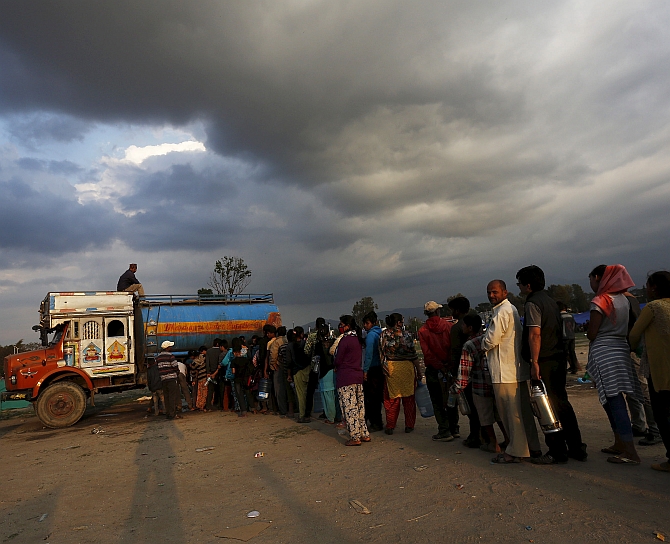
Oct 3, 2015- The prolonged Tarai unrest and subsequent trade blockade imposed by India have created losses estimated at $1 billion to the country, the Federation of Nepalese Chambers of Commerce and Industry (FNCCI) has said.The protests in the Tarai belt have lasted 50 days, while the blockade has crossed a week, creating spiralling effects on the country’s fragile economy that had been devastated by the April 25 earthquake.FNCCI President Pashupati Murarka said the total losses the country incurred had mounted to $1 billion while the impact was more severe on the investor sentiment. “This will result in a slowdown in potential investment and have a knock-on effect on the economy.”
Moreover, the strikes and border obstruction come ahead of the festive season. Nara Bahadur Thapa, chief of the research department at Nepal Rastra Bank, said the market should be vibrant with a huge
flow of cash.
But the strikes and blockade curtailed economic activities with repercussions on growth.
It was expected that major development projects would commence immediately after the earthquake, said Thapa. Since that did not happen, its negative impact would be on the economic output. At the same time, post-earthquake reconstruction works have stalled.
The central bank, in its latest macroeconomic report, shows a gloomy growth prospect in agriculture and non-agriculture sectors, including manufacturing, construction, trade, hotel and tourism, that bear direct brunt of the unrest. “All these developments relating to economic activities of the first month [of the current fiscal year] do not portend well and rather cast a shadow on the growth outlook for 2015-16,” the NRB said. Rajan Sharma, president of Nepal Freight Forwarders Association, said the losses from the blockade are incalculable.
According to him, traders and importers were forced to pay a cumulative Rs14 billion alone for detention charges and customs transit declaration penalty. He said importers were paying more than double the normal charge. The detention charge of a container has jumped from Rs40,000 to Rs100,000.
An estimated 4,200 cargo consignments of petroleum products, industrial raw materials and household commodities, among others, have been stranded at various bordering points in India. According to Chandra Kumar Ghimire, Nepali consular general in Kolkata, as of Thursday, 2,400 goods-laden containers have been stuck at seven Nepal-India border points. Nearly, 1,100 containers dispatched from the third countries have been stopped in Kolkata port.
The strikes have also affected the county’s agriculture sector. The Ministry of Agricultural Development said paddy production is likely to shrink significantly this year due to a failure to apply chemical fertilisers during the prime growing period since farmers have been unable to buy them due to the highway obstruction.
Having endured drought and erratic rain throughout the June-August transplantation period, farmers have now been hit by a shortage of the vital farm input. This may bring down the paddy yield, said ministry spokesman Uday Chandra Thakur.
According to Thakur, the ministry is yet to ascertain the expected amount of paddy losses, but some experts said output could plunge by at least 20 percent this year.
The tourism sector that was in the course of revival after the deadly earthquake has been hit by the unrest again. Tourism entrepreneurs had expected modest arrivals for the September-November period, the peak tourist season. But the Tarai strikes have dampened the industry hopes. According to BK Shrestha, president of the Hotel Association of Nepal, the tourism industry was in a buoyant mood after August when tourist bookings had started to pick up.
“The strikes, however, changed the scenario,” he said, adding that hotel occupancy has dipped below 40 percent. “The hospitality sector had disappointing performance during the peak tourist season.”
"This article was published on The Kathmandu Post (Oct 3, 2015)"












